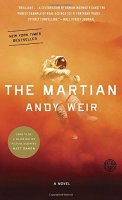 The Martian by Andy Weir (Crown, 2014)
The Martian by Andy Weir (Crown, 2014)
Our Christmas present from the library: we made the top of the wait list for The Martian. It was worth the wait and with one exception ranks as one of the best books I've read this year.
The exception? The profanity is even worse than in the movie. Unlike the movie, there's sexual innuendo, but nothing graphic. There's no violence at all, unless you count all the explosions that happen. Still, definitely NSFG (not safe for grandchildren). Which is a pity, because I know one, maybe three, who would love it. (This conundrum is the only drawback I know to having early and eager readers.)
That aside, The Martian is the perfect engineering nerd book, yet perfectly engaging for less technical folk. It's also incredibly well-written, and I'm picky that way. I'm guessing Andy Weir aced both the Math and the Verbal sections of his SAT's.
Having read the book, I can enthusiastically endorse the movie, which is remarkably, though justifiably not completely, true to the book. So go ahead, watch the movie. But don't stop there: read the book. There's more to the story.
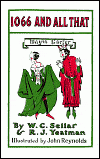
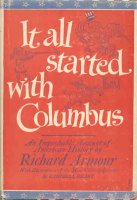
1066 and All That: A Memorable History of England by W. C. Sellar and R. J. Yeatman (Barnes and Noble, 1993, original 1931)
It All Started with Columbus: An Improbable Account of American History by Richard Armour (McGraw-Hill, 1953)
Attention teachers and parents: Next time a child whines, "Why do I have to learn history?" you are free to use my answer. "So you will be able to understand why these books are funny."
They are funny, and clever to boot, but without a solid grounding in history, and some literature as well, you're not likely to get the jokes. As poor as my knowledge of history is, I'm confident I know more about British history than most Americans; even so, a good bit of 1066 and All That left me scratching my head.
It went better with It All Started with Columbus, which does the same thing for American history, a subject on which I am still apallingly ignorant but at least savvy enough to get most of the jokes. It doesn't cover as many years, America having less history than England, but unlike the British book, it gets past World War I. Not much past, however. I wonder if anyone's written a sequel to either of the books.
I think Armour was the better writer, but that may just be the influence of my greater familiarity with his subject. Armour pays homage to his inspiration in the book's dedication:
Humbly dedicated, in an attitude of gratitude, to Walter Carruthers Sellar and Robert Julian Yeatman, who wrote the wonderful 1066 and All That
From 1066 and All That:
The Scots (originally Irish, but by now Scotch) were at this time inhabiting Ireland, having driven the Irish (Picts) out of Scotland; while the Picts (originally Scots) were now Irish (living in brackets) and vice versa. It is essential to keep these distinctions clearly in mind (and verce visa).
From It All Started with Columbus:
[Benjamin Franklin] was self-educated, which means that he was too poor to go to school and therefore got a good education.
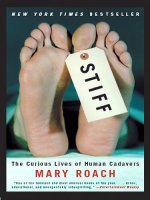 Stiff: The Curious Lives of Human Cadavers by Mary Roach (W. W. Norton, 2003)
Stiff: The Curious Lives of Human Cadavers by Mary Roach (W. W. Norton, 2003)
This was another gift from my library-book-sale-scrounging sister-in-law, who does an amazing job of finding books I like. This one I doubt I'd have picked out on my own, but it was fascinating reading. Best of all, Mary Roach is an excellent writer. I'd reckon not many people could write about such a gruesome topic with respect, accuracy, and humor.
The hardest chapter to read was on cannibalism, especially about the consumption in China, "for medicinal purposes," of aborted babies. Wanting to find out if this was true or an anti-Chinese urban legend, the author investigated and was told that it used to be true, but the government had subsequently declared the practice of selling aborted babies illegal. Further investigation revealed, however, that the reason for the ban was so that the government could hold a monopoly on the business....
The chapter on head transplants was nearly as disturbing, and reminded me strongly of C. S. Lewis's That Hideous Strength, which was written in 1945 and shows the influence of early experiments in the field.
The most interesting and informative chapter was on the use of forensic analysis to help determine the cause of an airplane crash. Analysis of remains helps determine if a bomb was involved, and if so where it was placed (how fragmented are the bodies, and what is the pattern of embedded shrapnel?), if the plane was hit by a missile (what parts of the bodies were burned?), and where the plane broke apart (which bodies were clothed, and which nude?). As I suspected, the purpose of all the airplane safety lectures is to help with near-ground crashes. Break up in midair and, as Roach puts it, you've booked your final flight. The kinds of problems that cause a plane to rip apart high in the sky are simply not survivable.
Take-off and landing crashes are potentially survivable 80 to 85 percent of the time. However...
The key word here is "potentially." Meaning that if everything goes the way it went in the FAA-required cabin evacuation simulation, you'll survive. Federal regulations require airplane manufacturers to be able to evacuate all passengers through half of a plane's emergency exits within ninety seconds. Alas, in reality, evacuations rarely happen the way they do in simulations. "If you look at survivable crashes, it's rare that even half the emergency exits open," says [injury analyst Dennis] Shanahan. "Plus, there's a lot of panic and confusion." Shanahan cites the example of a Delta crash in Dallas. "It should have been very survivable. There were very few traumatic injuries. But a lot of people were killed by the fire. They found them stacked up at the emergency exits. Couldn't get them open." Fire is the number one killer in airplane mishaps. It doesn't take much of an impact to explode a fuel tank and set a plane on fire. Passengers die from inhaling searing-hot air and from toxic fumes released by burning upholstery or insulation. They die because their legs are broken from slamming into the seat in front of them and they can't crawl to the exits. They die becajuse passengers don't exit flaming planes in an orderly manner; they stampede and elbow and trample.
The secret to surviving in such a situation? Sitting close to an exit is number two, but the most important, statistically, is to be male. I guess "women and children first" only works on ships, where chivalry has time to overrule our basic survival instinct.
Cadavers are useful for more purposes than people think when they nobly declare, "I want to donate my body to science": from anatomy class, to surgery practice, to automobile safety labs (crash test dummies can only go so far), to research on the most practical and ecological ways of disposing of bodies (intended to inform funerary practices, not murderers seeking to hide evidence). They're also used to analyze the effects of weapons of war, and I include the following for its Swiss reference:
Theodore Kocher, a Swiss professor of surgery and a member of the Swiss army militia (the Swiss prefer not to fight, but they are armed, and with more than little red pocket knife/can openers), spent a year firing Swiss Vetterly rifles into all manner of targets ... with the aim of understanding the mechanisms of wounding from bullets.
And one more, to show the kind of humor with which Ms. Roach lightens this difficult subject.
Our conversation has moved from White's lab to a booth in a nearby Middle Eastern restaurant. My recommendation to you is that you never eat baba ganoush or, for that matter, any soft, glistening gray food item while carrying on a conversation involving monkey brains.
 Pericles, Prince of Tyre
Pericles, Prince of Tyre
While there's no substitute for seeing a play live on stage, as it was intended, I'm thankful for the opportunity provided by the BBC and Netflix to work on my 95 by 65 goal #67, Experience all 37 of Shakespeare's plays (attend, watch, and/or read). Last night we watched their version of Pericles, Prince of Tyre. Back in 2007 we'd seen a reduced version of the play produced by our local Mad Cow Theatre, but it's safe to say we remembered almost nothing. Wikipedia provided a synopsis that helped greatly in following the convoluted tale. Fortunately, the diction and accents were not as difficult as they often are with Shakespeare, because this version included no option for subtitles, which we often find very helpful.
It's not one of the classics, and is suspected of being a collaboration between Shakespeare and a lesser playwright. Nonetheless, Pericles was one of the most interesting plays we've seen so far, largely because of its unfamiliarity. There's another reason why it's not studied in high school—or at least not in our high school days: the play begins with incest, and goes on to attempted rape, prostitution, a hint at lesbianism, kidnapping, attempted murder, and some pretty bawdy lines. Mild for today, but NSFG (not safe for grandchildren)—except, of course, that much of it would fly over their heads, especially without subtitles.
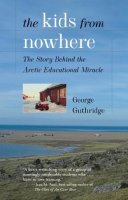 The Kids from Nowhere: The Story Behind the Arctic Educational Miracle by George Guthridge (Alaska Northwest Books, 2006)
The Kids from Nowhere: The Story Behind the Arctic Educational Miracle by George Guthridge (Alaska Northwest Books, 2006)
Jaime Escalante in Los Angeles, Marva Collins in Chicago, John Taylor Gatto in New York City, and George Guthridge in Gambell, Alaska, on the tip of Saint Lawrence Island, as remote as it gets: What do they have in common? A lot, it turns out. Each saw potential in children the educational system had given up on, each led those students to levels of academic excellence that would be envied anywhere, and each ran up against the most unbelievable opposition from other teachers, administrators, and the system itself. People who rock institutional boats are not generally well-liked, even if—maybe especially if—their results are outstanding.
In some ways George Guthridge reminds me of Bob Goff: a bit of a loose cannon, initial trouble finding his way in life, an unconventional thinker with an emphasis on action.
(click the image for an interactive version in Google Maps)
Guthridge, along with his wife and two school-aged daughters, moved to a small, isolated Alaskan Native village on an island near Siberia. The school in which they were to teach was troubled, threatened with closure, and expected almost nothing of its students. Teachers rarely lasted more than one year, sometimes less, and tended to give out good grades for any number of non-academic reasons: not wanting to damage the students' self-esteem, to avoid being beaten up, or simply out of laziness. The students were as unmotivated and disruptive as in any inner-city school written off by the educational system.
Out of this, despite very hostile colleagues and administrators determined to stop him, Guthridge created and coached teams for the Future Problem Solving competition, leading these children—to whom nearly nothing had been given academically and from whom even less had been expected—to two astonishing national championships.
More than just another testimony to the high capacity of children for excellence when they are respected and inspired, and to the criminality of a system that thwarts that excellence, The Kids from Nowhere is valuable for the thought processes by which Guthridge and the students learned to solve their problems.
Not until I was on sabbatical, working on a doctorate, did I start to understand what the kids and I had done ... the welding together of two ladders of learning. We married Western culture's syllogistic, abstract, linear thinking to the holistic, nonlinear, realistic reasoning of indigenous culture. The result is a communicator who addresses the world in a new way.
For that reason, and more, I highly recommend this book to any educators, but especially to homeschoolers, many of whom already have a desire to meld different ways of thinking and to look at the world in new ways.
This book was a Christmas gift back in 2013, and I picked it up recently primarily to make progress on 95 by 65 Goal #63 (Read 26 existing but as yet unread books from my bookshelves). I couldn't put it down. Part of my reasoning behind Goal #63 was to read books and then declutter them. But too often after I read them I don't want to get rid of them! This can't just go into the library book sale pile, though I'd be happy to pass it on to a good home—say to a homeschooling daughter?
Oddly enough, I have only three more quotes to add. I wasn't initially planning to review this book, just to read it and check it off of my list.... That's okay, though. You should read the whole story.
"[What can you do to] turn common ideas into original ones?" ... With a flourish I open the box and lift the funnel in triumph. ... "You funnel down the ideas," I say, holding the thing before them like a chalice. ... "Make them smaller. General ideas are almost never original ideas," I tell them. "That's because almost everyone knows general information. ... To have any hope of having original ideas, you have to be very precise. ... In writing, it's the little things that are important, not the general ideas. The same is true for Problem Solving. You funnel down the general to the specific."
So many faculty fear disappointing students that each kid ends up with several Certificates of Achievement. There seems to be little room for anything except success in contemporary education, as if no one fails in the real world. The trashcan outside the gym ends up with most of the certificates.
When Bruce and I review what are supposed to be rough drafts, I am stunned at how much the kids understand about genetic engineering.... The depth of their learning is almost comical, were it not so impressive. Because Bruce and I have made no distinction between the simple and the complex the kids don't either. They accept as second nature concepts that other kids might groan over. [emphasis mine]
At least at the time of publication, all the royalties from The Kids from Nowhere were being donated to build a school in the Himalayas.
.jpg) Lullaby by Steph Shaw
Lullaby by Steph Shaw
Here's a shoutout to our very talented cousin-in-law. (If there's a word for "son-in-law's cousin" I don't know it.) Steph Shaw is a singer-songwriter and the mother of three adorable girls. "Lullaby" was written with the first, recorded with the second, and released with the third.
Naptime. It's what you make of it.
Enjoy! And don't forget to check out Steph's Facebook page.
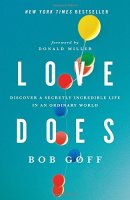 Love Does: Discover a Secretly Incredible Life in an Ordinary World by Bob Goff (Thomas Nelson, 2012)
Love Does: Discover a Secretly Incredible Life in an Ordinary World by Bob Goff (Thomas Nelson, 2012)
I learned of Bob Goff through reading A Million Miles in a Thousand Years by Donald Miller. To me, the story of how Goff and his family became friends with heads of state from around the world was by far the best part of the book. But I never followed up, never looked further into the man and what he might be doing.
It was Janet who tossed his name back in my direction. She distills the best of Love Does in her post at Blue Ocean Families, so be sure to read it.
I could say that Bob Goff is the anti-me, both good and bad. He epitomizes extroversion and spontaneity. He cares little for details and less for the kind of theology that involves studying. He is a loose cannon—at first I wondered why all those non-profit organizations turned down his offer of the services of his law firm, gratis, but now I think I know why they wanted someone more predictable, if also more expensive and less creative.
However, I am inclined to believe that the Bob Goff who shows up in this book is an exaggeration of his character for dramatic effect: Surely no one can succeed as a lawyer, not to mention as the head of a non-profit organization, without caring more for structure, organization, and planning than the man portrayed here.
Take your ten-year-old daughter on a spur-of-the-moment trip to London, without the least idea of what you're going to do, not even where you're going to stay? Okay, I can see that. They speak English (of a sort) there, he's an experienced traveller, and he has enough money to fund last-minute air fares and hotel stays.
Take your ten-your-old son climbing Half Dome in a blizzard, on purpose? As one with personal connections to the expert and experienced climbers who perished on Mt. Hood in 2006 due to unexpected bad weather, this strikes me as less adventuresome than plain stupid, even if it turned out to be a great experience for them both.
I have to believe that Goff was much more prepared for both adventures than he lets on.
There's no doubt, however, that a good deal of that preparation was provided by a lifetime of sponanteous action. Bob Goff lived the "just do it" slogan long before it became a Nike ad, and his life is a testimony to the incredible things that can arise from that attitude. As Janet's article states, what he has done is so amazing that it's hard to imagine him as a role model for us ordinary mortals. But he certainly can be an inspiration.
To that end, I do not necessarily recommend reading Love Does. At least not first. Instead, go to Goff's website. You'll get a good introduction there, and his informal style works better in a speech or on a blog than in a book.
It was in the fifteenth chapter that I learned why the style of Love Does bothers me so.
Don is a friend of mine. He's written a bunch of books. ... Don actually played a big part in this book. He would review what I wrote and tell me to keep working on it or take it out of the book. Sometimes he'd tell me to start over entirely or tell me what to do to make it better.
That's right; the above-mentioned Don Miller, whose style rubbed me the wrong way in A Million Miles in a Thousand Years, was the primary influence on how Goff wrote his book.
Here's an example of his fingernails-on-the-blackboard style, which I acknowledge some will enjoy. Just not me, if it's in a book or other formal publication.
In the Bible there's a guy named Timothy who gets a letter from another guy named Paul.
What also sets my teeth on edge is the number of times I've groaned, "Didn't anybody read this book before publishing it?" I don't blame Goff so much—it's hard to find the errors in one's own writing. But where were the proofreaders and editors here? Where was Don Miller? How, for example, could they publish "laundry mat" instead of "laundromat," "cast" instead of "caste," "track homes" instead of "tract homes," and "chalks" instead of "chocks" (the last from his website)?
I'm nitpicking, you say, and you're right. Neither the style nor the errors negate the value of what Bob Goff has to say. Nevertheless, there's a reason even the most brilliant job-seeker is advised to dress appropriately for his employment interview, and the most innocent (as well as the most guilty) defendant to ditch the nose ring and cover the tats for a court appearance. Even Bill Gates has assistants to keep his personality quirks from reducing his effectiveness.
Okay, I'm done with the complaints. Bob Goff is amazing, and inspiring. I just need to find my own path to being secretly incredible.
I think God's hope and plan for us is pretty simple to figure out. For those who resonate with formulas, here it is: add your whole life, your loves, your passions, and your interests together with what God said He wants us to be about, and that's your answer. If you want to know the answer to the bigger question—what's God's plan for the whole world?—buckle up, it's us.
Being secretly incredible goes against the trend that says to do anything incredible you have to buy furniture and a laptop, start an organization, have a mission statement and labor endlessly over a statement of faith. Secretly incredible people just do things. ... [T]he task would probably be even nobler if we didn't talk about it and just did it instead. It's not about being secretive or mysterious or exclusive. it's about doing capers without any capes.
Sometimes my clients have to be deposed, which means they are the ones asked questions by the other guys' lawyers. It can feel intimidating with a big room full of lawyers all staring at you. So when my clients are being deposed, I tell them all the same thing each time: sit in the chair and answer the questions, but do it with your hands palms up the whole time. I tell them to literally have the backs of their hands on their knees and their palms toward the bottom of the table.
I'm very serious about this. ... When their palms are up, they have an easier time being calm, honest, and accurate. And this is important, because it's harder for them to get defensive. When people get angry or defensive they tend to make mistakes.
If you're like me, I'd ask myself at the end of a book called Love Does—so what do I do? It can be a tough question to answer, honestly, but it can also be an easy one. Let me tell you want I do when I don't know what to do to move my dreams down the road. I usually just try to figure out what the next step is and then do that. ... What's your next step? I don't know for sure, because for everyone it's different, but I bet it involves choosing something that already lights you up. Something you already think is beautiful or lasting and meaningful. Pick something you aren't just able to do; instead, pick something you feel like you were made to do and then do lots of that.

Porter read a review of The Martian that made him want to see it in a theater instead of waiting for it to become available on Netflix.
I believe the previous time we watched a movie in the theater was Christmas of 2013, when we saw part two of The Hobbit with some of our nephews and their friends. The social aspect seems to me about the only reason to go to a theater, and even for that I prefer watching at home, since at the theater you can't pause the movie to discuss it, nor rewind to catch a bit of dialogue you missed.
Another reason is for the sensory experience of the large screen and speakers, and in this case, the 3D effects. These are largely lost on me: I'm just as happy with the picture on our relatively small-screen TV, and I wear earplugs to protect my ears from the booming speakers. I have little experience with 3D movies beyond the kind they have at Disney World—where things jump out at you and are accompanied by puffs of air at your legs and vibrations of your seat. For The Martian the effects were simply visual, with nothing even to make me jump, and I don't think it added anything to the film, certainly not enough to warrant wearing the annoying glasses. Then again, I'm not one to be all that aware of dimensionality in the real world, so your mileage may vary.
The movie itself? It was good. Unusually good. I'm not much of a movie fan, and it takes a lot to get a "good" rating out of me. I'm told that The Martian is unusually true to the book, which was unusually well-researched and true to the science and engineering behind space travel. For people like us, who grew up in the era of manned space exploration, it does ring (mostly) true, not only in the technical aspects but also in the characters, from astronauts to politicians. It's an edge-of-your-seat thriller with a satisfying ending. I'd recommend it heartily were it not for one disturbing problem.
Why, O why do novelists and filmmakers believe they must include gratuitous profanity in their works? The Martian is otherwise SFG (Safe For Grandchildren), and I should be happy enough that this is a popular, mainstream, modern movie with neither sex nor shootouts. Instead there's resourcefulness, loyalty, determination, and celebration of both cooperative work and the lone-ranger nerd. But the bad language added less to the film than the 3D effects—and was more annoying than the special glasses—while taking a valuable, educational, and inspirational experience off the table for some boys I know who would have enjoyed it a lot.
Bad language aside—and there's not that much of it—if you liked Apollo 13, you won't want to miss The Martian.
We're 47th in line at the library for the book.
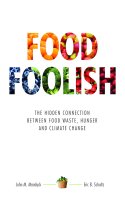 Food Foolish: The Hidden Connection Between Food Waste, Hunger and Climate Change by John M. Mandyck and Eric B. Schultz (Carrier Corporation, 2015)
Food Foolish: The Hidden Connection Between Food Waste, Hunger and Climate Change by John M. Mandyck and Eric B. Schultz (Carrier Corporation, 2015)
Have you ever heard of a cold chain? Me, neither. Yet we have depended on cold chains all our lives. If you don't drink your milk as it comes from the cow, then your life depends its being kept cold, whether it goes straight from the cow to your refrigerator, or travels thousands of miles in a refrigerated truck before being placed in the refrigerated dairy section of your grocery store. That vaccine your child just received? Useless, if it hasn't been kept sufficiently cool on its way from the manufacturer. Unless they're kept cool, fruits and vegetables start rotting the moment they're picked, losing flavor and nutrition, eventually becoming unusable.
The cold chain explains why the Carrier Corporation published Food Foolish. Keeping things cool is their business, and they've made it their business to develop sustainable technologies to do so. Along the way, they discovered a shocking truth: At least a third of all the food we produce in a year is never eaten.
The impact of food waste on hunger, climate change, natural resources and food security is enormous. It's changing the way we think about our product and technology development. It's strengthening our commitment to sustainable innovation. It's also prompting us to convene research and food chain experts to find solutions. We believe that food waste is an issue that must be elevated and examined globally. That's why we published Food Foolish. It's not an attempt to be the final word on the topic of food waste. Rather, it's meant to connect the issues of hunger, resource conservation and climate mitigation. We hope it will be a catalyst for more meaningful global dialogue which, many think, is essential to the sustainability of the planet.
That's why Carrier published the book. What do the authors say about why they wrote it?
Hunger, food security, climate emissions and water shortages are anything but foolish topics. The way we systematically waste food in the face of these challenges, however, is one of humankind's unintended but most foolish practices. We wrote this book to call attention to the extraordinary social and environmental opportunities created by wasting less food. We are optimistic that real solutions to feeding the world and preserving its resources can be unlocked in the context of mitigating climate change.
Food Foolish is a small book (182 pages) but very powerful. We're reasonably conservationist-minded around here, having been brought up that way. I feel pretty good that we put very little trash out on solid-waste pickup day, and the reason there's not usually much in our recycling bins is that we consume far less soda and beer than average. We take short showers and are in other ways mindful of our water use. Except for animal products, almost all of our food waste goes to feed our composting worms.
Ah. Our food waste. That broccoli that got shoved to the back of the refrigerator and forgotten? It fed the worms, so it's all good. Or maybe not....
When we consider ways to protect our fragile water resources, we need to look first and foremost at the global food supply chain. California provides one good example. The state produces nearly half of all U.S. fruits, vegetables and nuts from the very areas hardest hit by drought. Monterey County alone produces about half of the country's lettuce and broccoli.
Now imagine a consumer rummaging around in the back of his refrigerator's vegetable drawer only to find a forgotten head of broccoli, now yellow and unappetizing. He drops it in the trash. No big deal, right?
But wait: Fresh broccoli is about 91 percent water, and that's just the start. It actually takes a farmer about 5.4 gallons of water to grow that single head of broccoli. Just as each food product has an embedded carbon footprint, it also has a quantity of embedded freshwater from its journey along the food supply chain. In fact, a single person blessed with a healthy, nutritious diet will drink up to a gallon of water per day but "eat" up to 1,300 gallons of embedded freshwater in his food.
This little book stuck a sharp pin in my pride. Sure, it's better that the worms ate our spoiled broccoli than if it had gone into the landfill. But it was still a terrible waste. There's a lot more cost to producing food than what we see at the cash register. Water, fertilizer, pesticides, depletion of the soil, labor, storage, transportation—the human and environmental costs of that head of broccoli make it far too costly to become mere worm food.
Food waste also has a devastating impact on the environment. The water used to grow just the food we discard is greater than the water used by any single nation in the world.
[I]f food waste were a country by itself, it would be the third largest emitter of greenhouse gases behind China and the United states. Yet the connection between food waste and climate change is missing from policy discussions and public discourse.
Throughout history, human ingenuity has consistently foiled those who prophecy imminent doom in the form of mass starvation. Thomas Malthus (in 1798) and Paul Ehrlich (in 1968) both assured us that population growth inevitably leads to massive famine. Ehrlich specifically predicted that no matter what we tried to do about it, hundreds of millions of people were going to starve to death in the 1970's.
Fortunately, both Malthus and Ehrlich were wrong. Since The Population Bomb was published in 1968, the world's population has doubled to over 7 billion people. Despite this increase, humankind has managed to grow its food supply faster than its population. Eighty percent of the victims of famine in the last century died before 1965. Since the mid-20th century, famine has been more a function of civil disruption than of limited food supply.
The Green Revolution spiked Ehrlich's misanthropic guns, but the concern is back, and with reason. Dependent as it is on oil-based fertilizer, irrigation, and monoculture crop farming, the Green Revolution in its original form is not sustainable. A different kind of agricultural revolution is needed.
The political will exists to improve upon the gains of the Green Revolution, bu the landscape has changed. While the focus remains on alleviating chronic hunger, there has emerged a fundamental understanding that simply expanding farmland and improving crop yields are insufficient to feed a growing planet. Any new solution must be sustainable. ... Observers agree that if humankind wants to engineer a new "miracle" to help feed our growing planet, it must be fundamentally different in shape and substance from the Green Revolution of the 20th century.
Enter food waste awareness. By the numbers, if we could eliminate food loss altogether, we could increase our food supply by 50 percent! In the real world, complications must enter the equation; even so, reduction of food loss and waste is an area of tremendous potential for feeding the world while healing the environment.
Food Foolish covers a lot of ground, and if you like concrete information densely but attractively presented, you'll be happy. (If you're fond of Oxford commas, you will be less pleased, but their lack is not as obvious when reading as it was to me when typing up the quotations below—and having to backspace again and again to remove the comma that my fingers automatically insert when typing lists.) Yet the authors cannot cover everything, which I remind myself when I consider issues of corruption, abuse of power, and even bloated bureaucracy that keep food from reaching the hungry. As the International Justice Mission has noted, we can provide people with food, skills, books, schools, medical supplies, tools, seeds, and even land, but without honest and functional political and legal systems, they won't be able to hang onto them. Clearly the problems of hunger, resources, and the environment must be tackled on many fronts.
Fixing the global food supply chain requires investment. ... Sometimes the humanitarian return of "doing good" is enough; certainly governments spend simply for the good of their citizens. Other times a true financial return is required to persuade people to act, especially in the private sector. The moment those two returns intersect is a moment of critical mass, when doing good and doing well align, rapidly accelerating innovation and new investment.
There is precedent for this kind of global alignment. In 1993 the U.S. Green Building Council was formed to promote sustainability in building design, construction and operation. At the time, green investment seemed expensive and was misunderstood. "Prior to the U.S. Green Building Council," remembers Rick Fedrizzi, CEO and founding chairman, "Environmental organizations and business lined up against one another. What we did at USGBC was to create a place where business could actually engage one-on-one with environmental and government organizations. By having a voice and a pace at the table, some of the best ideas imaginable have come forward."
...
The global green building movement began as a way to protect the planet and "do the right thing." Today it has become a business imperative that drives real financial return, including significant improvements in tenant occupancy and retention with higher rents and overall building value.
One of the strengths of Food Foolish is its emphasis on positive actions more than blame, and its revelations of the global nature of both the problem and the solutions: everyone has a part to play. Half of all global food loss occurs in Asia, and there's much that can be gained from solving the problem there. But ...
What does food loss look like per person? On a per capita basis, Europe, North America, Oceania and Industrialized Asia waste between 300 and 340 kg of food per year. South and Southeast Asia, despite high absolute waste, have among the smallest per capita at 160 kg. In addition, in medium- and high-income regions, most waste occurs at the end of the supply chain when food is discarded by consumers and retailers. This means that energy inputs such as harvesting, transportation and packaging are embodied in the food. For example, if we must waste a tomato, it's relatively better to have it decompose in the field rather than pick, clean, pack, cook, ship and display it at retail, only to have it thrown out by a consumer.
There are two very different kinds of problems associated with food loss and waste. One is structural in nature: bad weather, poor roads, improper packaging and an inadequately refrigerated distribution system. Many of these issues can be addressed through careful planning, poliitcal will and sufficient investment. And then there are problems taht are economic and cultural in nature, powerful forces almost built into the system. Food too expensive to be purchased will rot in the warehouse. Food too unprofitable to harvest will be lost in the field. Meal servings that are twice what a person can eat will be partially discarded. A perfectly edible apple with harmless spots or a misshapen carrot might be tossed in a landfill if there are cheap and perfect alternatives. The elements of supply and demand, pricing, tradition and culture all play an important role in food loss and waste. Most of all, ... [it is] clear that there are challenges and opportunities enough for the entire global community.
Developing nations can have the greatest impact on food loss, hunger, land use, climate change, and ... freshwater by focusing on upstream improvements—harvest and distribution—in the food supply chain. Developed countries need to emphasize reductions in downstream food waste.
And now for the random quote section you all look forward to. I warn you that it's just a taste of the book and I've left a lot of important stuff out. (More)
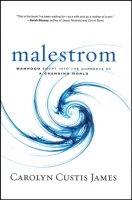 Malestrom: Manhood Swept Into the Currents of a Changing World by Carolyn Custis James (Zondervan, 2015)
Malestrom: Manhood Swept Into the Currents of a Changing World by Carolyn Custis James (Zondervan, 2015)
Malestrom is the fifth of Carolyn Custis James' books I have read and reviewed. (Most recently, Half the Church; you can find links to my other reviews there.) It's similar in style to her other books, which is both good and bad. Actually, I'm getting a little tired of that style, and of her confidence that she has discerned the feelings and motivations of Biblical characters. Trivially, may I say again how much I dislike questions at the end of the chapters? And what was she thinking with the title? I like wordplay as much as anyone, but we didn't need another excuse to be confused about the spelling of "maelstrom."
Okay, whining over. The great thing about Carolyn James is that she is an intelligent, seminary-trained, Christian woman who focuses all four of those attributes on questions that the church has not done well at answering.
Such as, What have we done to our men? As society has redefined what it means to be a woman, and what roles women can successfully fill, has that changed what it means to be a man? Has the cultural definition of manhood ever been satisfactory? How can we help our boys to become men when we don't even know what a man is supposed to be?
Not that James provides any down-to-earth, practical answers; she herself states that she reached the end of the book with more questions than when she started. But she has erected a framework on which to build, and offers several fresh insights to assist with that labor.
Here is my take on that framework:
- The purpose and role of all human beings, male and female, is to be—in life, in action, in relationship—the Image of God that they are.
- The Image of God cannot be revealed without both male and female. Not male and female individually, but "male and female" together.
- There's an important blank space at the beginning of Genesis. We see Creation, we see the Fall—what we don't see is how life and purpose were fleshed out for human beings in the time between those events.
- One of the tragic consequences of the Fall was the near-universal development of patriarchical systems of power—the Malestrom—which have pitted men not only against women, but also against other men in a scramble to be at the top of the power pyramid.
- Just because God worked through a patriarchical system to reveal himself and bring about restoration of his image-bearers, that doesn't imply the system itself was good. In many ways the history of God's interventions is a history of exceptions to the rules of patriarchy, especially once Jesus comes on the scene.
- Jesus is the true Image of God, and the ultimate revelation of the "missing chapter" in Genesis. He is therefore also the truest and best example of what it means to be a man. (Or a woman, for that matter, but Malestrom is largely about men. Women are covered in James' other books.)
You may not agree with all of James' conclusions. You may groan for less theory and more practice in her writings. I'm with you on both counts. But that doesn't change the fact that Carolyn Custis James is a vital voice in the Church today. She's asking important questions, providing new insights, and challenging us to consider how well our assumptions, our traditions, our words, our policies, and our actions reveal the Image of God to a world that's in a world of hurt.
And now for the quotations. They're pretty random, but that's where the sticky notes fell. (More)
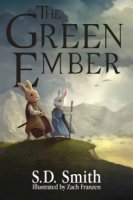
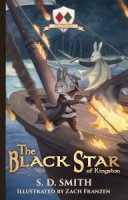
The Green Ember by S. D. Smith (Story Warren Books, 2014)
The Black Star of Kingston by S. D. Smith (Story Warren Books, 2015)
My place beside you, my blood for yours,
Till the Green Ember rises, or the end of the world!
The Green Ember stories began on a porch in West Virginia, with S. D. Smith and his young daughter watching rabbits cavort in their yard. Soon Smith began telling her stories about those rabbits and their adventures. Like rabbits, the stories multiplied. So did Smith's children (though not like rabbits) and they all loved the stories about #RabbitsWithSwords.
Finally, Smith decided to share his stories with a larger audience. If you want to know more, you can watch what apparently was their Kickstarter promo video. If it sounds a little funny in places, that's because for some reason the references to Kickstarter have been blanked out in this version.
The Green Ember is just a story. It's not a lesson, it's not a sneaky vehicle to teach you something. It's just a story. But I believe in the power of stories. — S. D. Smith
I also believe in the power of stories, whether from a book, a movie, a video game, or any other medium. Even at my age I must be careful what stories I let myself experience, because I'm so vulnerable to their effects. By now most of you know what's coming, my definition of a good book, slightly paraphrased: A good story inspires me to be a better person. These are good stories, not at all in a syrupy way, but shot through with reality, life, action, and beauty.
Yes, I realized I just used the term "reality" about a book with anthropomorphized animals.
It was a little jarring at first to wrap my head around the idea that the rabbits have both human and rabbit physical characteristics. That is, they are fully capable of using their front paws as hands (e.g. wielding swords, making stained glass windows, knitting), while their hind legs are rabbit-style powerful weapons. But it didn't take me long to get over it. (I wonder if it helped or hindered that I was at the same time reading Uncle Wiggily's Adventures. For the record, much as I respect the bunny rabbit gentleman, The Green Ember is 'way better.)
Let's see, what do I like about this book, other than its positive impact and the fact that I was immediately entranced and didn't want to put it down?
- The primary protagonist is a strong female character. I've mentioned before how I grew up with books that made me embarrassed to be a girl, and nearly always identified with the male characters instead. Here's a female character who can think, fight, nurture, worry, and push herself beyond her limits.
- This rabbit heroine is named Heather!
- The secondary protagonist, Pickett, is highly intelligent and mathematically talented, and his gifts don't make him a freak, but rather a valuable asset in the community.
- Due to his young age and the trauma in his life, Pickett has some dangerous emotional issues. The wisest rabbits in the community don't seek to make him "normal," but instead help him find healing through becoming more, not less, himself.
- This is very much a medieval rabbit world. They fight with swords and arrows—and feet and just a little bit of gunpowder. They make clothing by hand. Skills are learned through apprenticeship. Somehow chivalry and honor and high callings fit better in a medieval-themed world, as J.R.R. Tolkien and C.S. Lewis amply demonstrated. Even George Lucas peopled his high-tech future with swords and knights.
- The rabbit community values, supports, and praises excellence in every good endeavor, from cooking to fighting to building to storytelling. The end of the rabbits' world seems imminent, yet they emphasize the importance of the arts, and value doing the work of ordinary life extraordinarily well.
The ending of The Green Ember begs for a sequel, and I understand one is in the works. In the meantime, there's Smith's second book, The Black Star of Kingston. It's a distant-past prequel to The Green Ember, and definitely enjoyable to read in its own right. It's not quite as satisfying, mainly because it's much shorter, but also because the strong female characters are mostly missing. Perhaps even rabbit civilizations need to develop over time.
Thanks, Serina T. for recommending The Green Ember, and especially for letting me know about the amazon.com special when I could get the Kindle version for free. I'm hooked, of course, and bought The Black Star of Kingston at full price. Not that $3.99 is going to break the bank around here.
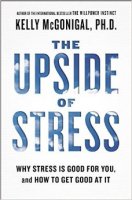 The Upside of Stress: Why Stress Is Good for You, and How to Get Good at It by Kelly McGonigal (Avery, 2015)
The Upside of Stress: Why Stress Is Good for You, and How to Get Good at It by Kelly McGonigal (Avery, 2015)
For a book that has such an important message, and which my read-through has left bristling with sticky notes, this was surprisingly hard to finish. It's equally hard to summarize for this review. I'd hoped that McGonigal's TED talk would be an inspiring summary, so I wouldn't have to say, "read the book." But the talk lacks the details and documentation of the book, and, since it came before the book, lacks several key elements. So I'll say it: "Read the book."
Now, I know that most of you won't, so here's a taste.
Despite everything you've heard, it's not stress that's killing you. What's killing you is believing that stress is killing you. If you see stress as a positive force, it does you no harm. Like grasping the nettle.
Oh, great. So not only is stress killing me, but it's all my fault because I can't make myself pretend it isn't killing me....
Relax. It's not that bad. Really.
As a health psychologist, Kelly McGonigal had made a career out of telling people how bad stress is for their health, and teaching them techniques to help reduce it. But then she came across a study that indicated that by encouraging people to fear and avoid stress, wasn't helping them, but making their lives worse. She might have ignored, or discredited the research, but instead threw herself into investigating this crazy idea, and came away convinced.
In 1998, thirty thousand adults in the United States were asked how much stress they had experienced in the past year. They were also asked, Do you believe stress is harmful to your health?
Eight years later, the researchers scoured public records to find out who among the thirty thousand participants had died. Let me deliver the bad news first. High levels of stress increased the risk of dying by 43 percent. But—and this is what got my attention—that increased risk applied only to people who also believed that stress was harming their health. People who reported high levels of stress but who did not view their stress as harmful were not more likely to die. In fact, they had the lowest risk of death of anyone in the study, even lower than those who reported experiencing very little stress.
The researchers concluded that it wasn't stress alone that was killing people. It was the combination of stress and the belief that stress is harmful. The researchers estimated that over the eight years they conducted their study, 182,000 Americans may have died prematurely because they believed that stress was harming their health.
... According to statistics from the Centers for Disease Control and Prevention, that would make "believing stress is bad for you" the fifteenth-leading cause of death in the United States, killing more people than skin cancer, HIV/AIDS, and homicide.
But there's good news: very small changes can have a great effect on how we look at stress. A brief lecture on the benefits of stress, ten minutes spent writing about what values we find important; such brief interventions have been shown again and again to have long-lasting effects. This isn't a think-and-get-rich plan, nor a placebo effect, but more of a butterfly effect.
[T]o many, these results sound more like science fiction than science. But mindset interventions are not miracles or magic. They are best thought of as catalysts. Changing your mindset puts into motion processes that perpetuate positive change over time.
A belief with this kind of power goes beyond a placebo effect. This is a mindset effect. Unlike a placebo, which tends to have a short-lived impact on a highly specific outcome, the consequences of a mindset snowball over time, increasing in influence and long-term impact.
I'm very bad at doing the "exercises at the end of the chapter" in any book, but even so, simply reading through this one has already made a difference in my life. How much remains to be seen, but the butterfly has flapped its wings, and I'm looking forward to seeing what happens.
And now for the quotes. Extensive, yes, but I'm still leaving too much out. If you can get the book from a library, as I did, it will be well worth your while; it's repetitive enough that you can skim and get the major points. Is it worth $13 for the Kindle version? I don't know; maybe it depends on how stressed you are.... (More)
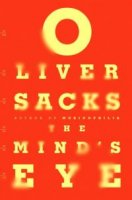 The Mind's Eye by Oliver Sacks (Alfred A. Knopf, 2010)
The Mind's Eye by Oliver Sacks (Alfred A. Knopf, 2010)
Books like this are why I need goal #63 (Read 26 existing but as yet unread books from my bookshelves) on my 95 by 65 list: I'm always finding reasons to get a new book out of the library. In this case, I was to visit a friend, who, like me, has discovered that she is face-blind. The Mind's Eye has a chapter on face-blindness, and I wanted to be more prepared for our discussion.
I had discovered my own face-blindness quite recently, while watching a 60 Minutes report. You can see part 1 of that report here, and part 2 here. The show also provided a test for face-blindness, which I failed spectacularly, though in reality the test is all but useless for people not well-versed in pop culture. Nonetheless, seeing my own life experiences reflected in the report was more than enough to put a name to my own disability.
Were it not so awkward, perhaps one should say, "face-visually-impaired," because the ability to recognize faces actually lies more on a bell curve, with about ten percent of the population with significant impairment—about the same percentage as of those with dyslexia.
Dr. Sacks himself has severe prosopagnosia, the technical term for face-blindness, along with another trait that is often linked with it: inability to recognize places.
The meeting of two people with prosopagnosia...can be very challenging. A few years ago, I wrote to one of my colleagues to tell him that I admired his new book. His assistant then phoned Kate [Sacks' assistant] to arrange a meeting, and they settled on a weekend dinner at a restaurant in my neighborhood.
"There may be a problem," Kate said. "Dr. Sacks cannot recognize anyone."
"It's the same with Dr. W," his assistant replied.
"And another thing," Kate added. "Dr. Sacks cannot find restaurants or other places; he gets lost very easily—he can't even recognize his own building sometimes."
"Yes, it's the same with Dr. W.," his assistant said.
Somehow, we did manage to meet and enjoyed dinner together. But I still have no idea what Dr. W. looks like, and he probably would not recognize me, either.
In neither trait am I anywhere near as badly off as Dr. Sacks, but this probably explains why my husband quickly developed a mental map of the city of Basel, Switzerland our first time there, whereas it took me several visits and—what was most efficacious—the opportunity to explore on my own, retracing my steps, memorizing landmarks, and such, before I became comfortable in the city at all.
The remaining six chapters of The Mind's Eye cover other aspects of the mental component of our visual experience, based on Sacks' research, the lives of his patients, and surprisingly often, his own health problems. The other subject that intrigued me the most was on stereo vision, which for people with normal eyesight also turns out to be more of a continuum than either/or. This chapter confirmed for me what I had noticed a while back: I can see stereoscopically with no problem, but I don't always do it. I find it entertaining to take the time, while looking at a scene, to think about stereo vision, and watch the landscape come alive. When I'm in a hurry, or thinking about something else—as I almost always am—I take in scenery as I gulp words from the page of a book: some details may be lost. My daughter reads more slowly, but creates a rich visualization of what she reads; I wonder if she is more aware of the three-dimensionality of the world?
Oliver Sacks has written many more books, most of which, I'm sure, are as interesting as this one. But I have #63 to work on....
Yesterday I completed my 95 by 65 Goal #57: Finish chronological Bible reading plan. Ever since I read a review copy of The Chronological Guide to the Bible (five years ago), I've wanted to read the Bible through in the approximate order of the events. There isn't complete agreement among scholars on the details of the order, but "approximate" is good enough for me. I've made various stabs at the project over the years, and even put the information from the Guide onto a bookmark—actually a set of bookmarks—to help me jump from place to place in my Bible correctly. It shouldn't have been that hard, but flipping back and forth and keeping track of where I was and where I was going next was just enough of a pain that my efforts kept petering out. Pitiful, I know, but the point of this post is not to talk about my failures, but my success at last.
What turned the tide was the YouVersion Bible app on my phone. They have a gazillion reading plans, most of which are not interesting to me, but one of them is set up to lead the reader through the entire Bible, chronologically, in one year. I owe a lot of thanks to our friend Christina S., who first introduced me to YouVersion, because I found this plan to be great!
The plan does all the work—except, of course, for the reading itself. Every day they send a notification to your phone: click on the notification and it takes you right to the plan. Click on the next day's reading and boom, there you are, at the right place in the Bible of your choice (they have lots to choose from). The end of one reading takes you directly to the next, until you've completed all the chapters for that day. You get a nice little congratulatory note, then close the app. Repeat every day for a year. Or, if you fall behind at any point, there's a catch-up function that shifts the plan dates for you. I took advantage of that once, in the beginning, but once I got the habit established, I found it easy to keep up. Really, the app makes it simple—easy enough that even in especially busy times I managed to squeeze the reading in. Because, as I said, it was right there, waiting for me. The folks at YouVersion, though I doubt they've ever heard of Glenn Doman, remind me of his saying that one of the secrets of the success of his educational and therapeutic programs is, "we arrange for the child to win." The YouVersion app arranged for me to win, and I did.
I loved the chronological path through the Bible, especially seeing how various events fit together, and reading one after the other the passages that are parallel but not identical. I came through the process with a much stronger feeling of the integrity of the Bible as the record of real people living their lives in the context of real history and culture, and of God revealed: gradually and progressively, though still imperfectly, through that record. Perhaps the feeling was stronger because of the contrast I experienced while reading through the Qur'an at the same time.
The chronological plan was so enjoyable that I'm sure I'll do it again, but at the moment I feel it's better to mix things up a bit. I'm sticking with the YouVersion app and their plans, however. Today I started a 30-day reading of the Gospels (Matthew, Mark, Luke, and John), one that covers every word but weaves together the events from the different books. As I said, I'm not interested in most of the YouVersion plans—many of them are "devotional," with more to read than just the Bible. Scholarly commentary I would be interested in, but just some random person's thoughts? Not so much. Yet there are still some plans with straight Scripture to try out, and the chronological plan to return to. I'm thrilled that the YouVersion people have arranged for this child to win.
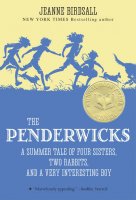
The Penderwicks: A Summer Tale of Four Sisters, Two Rabbits, and a Very Interesting Boy; The Penderwicks on Gardam Street; The Penderwicks at Point Mouette; and The Penderwicks in Spring by Jeanne Birdsall (Knopf Books for Young Readers, 2005, 2008, 2011, and 2015)
Many thanks to our daughter, who knows what her mother likes, for recommending this series to me. She called it a cross between Swallows and Amazons and The Saturdays, and that's a reasonable characterization.
Even as a child I preferred books written before my own time, and it's only gotten worse. I've read some good, recent children's books, but many are downright awful and few if any measure up to those from the past that have survived the filter of history. The Penderwicks series, I'm happy to say, is a wonderful exception.
My primary objection to modern books—my defnition of modern reaches back into the 1960's, at least—is that they want to be, well, modern. Like many miserable church youth groups, they attempt to be relevant by embracing the worst of the world rather than providing hope and a better vision.
The Penderwick world is a modern one, and hardly free of modern troubles: death, divorce, desertion, and depression all touch the lives of this family, as well as other troubles not beginning with "d." But none of these overwhelms the story, being swallowed up by family strength and loyalty, loving and reliable parents who are in turn loved and depended upon, and siblings who appreciate and care for one another. By hope and a vision of what family life can and should be.
Another thing I value in these books is that the children have serious interests—from writing to sports to music to science—that are appreciated and supported. That's a rare trait, and one way in which they remind me of The Saturdays.
There are things in the books I personally don't care for, e.g. children in daycare, and too much romance for my taste—though the latter is handled well, I'll admit. But overall, these are good books. And fun, too. Heather knew well the things that I would especially enjoy, such as certain book references, and the music teacher who enjoins, "you must choose a teacher who won't make you do that awful belting everyone is being taught these days."


